Entrepreneurship and Small Business Management
VerifiedAdded on 2023/01/19
|17
|5007
|73
AI Summary
This document discusses the various types of entrepreneurial ventures and their relation to entrepreneurship typologies. It also explores the impact of micro and small businesses on the economy and the significance of small businesses and business start-ups to the growth of the social economy.
Contribute Materials
Your contribution can guide someone’s learning journey. Share your
documents today.

Entrepreneurship and
Small Business
Management
Small Business
Management
Secure Best Marks with AI Grader
Need help grading? Try our AI Grader for instant feedback on your assignments.
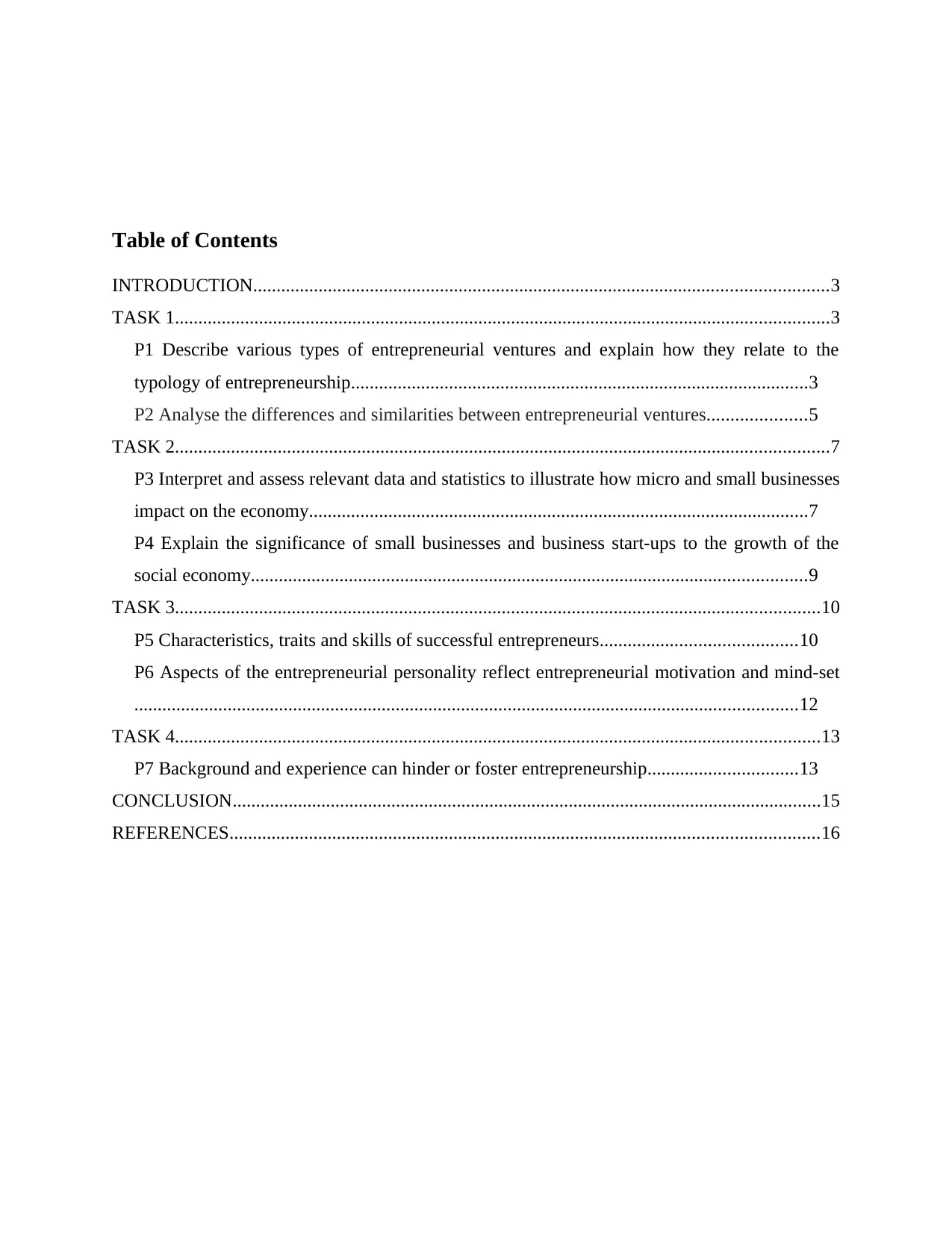
Table of Contents
INTRODUCTION...........................................................................................................................3
TASK 1............................................................................................................................................3
P1 Describe various types of entrepreneurial ventures and explain how they relate to the
typology of entrepreneurship..................................................................................................3
P2 Analyse the differences and similarities between entrepreneurial ventures.....................5
TASK 2............................................................................................................................................7
P3 Interpret and assess relevant data and statistics to illustrate how micro and small businesses
impact on the economy...........................................................................................................7
P4 Explain the significance of small businesses and business start-ups to the growth of the
social economy.......................................................................................................................9
TASK 3..........................................................................................................................................10
P5 Characteristics, traits and skills of successful entrepreneurs..........................................10
P6 Aspects of the entrepreneurial personality reflect entrepreneurial motivation and mind-set
..............................................................................................................................................12
TASK 4..........................................................................................................................................13
P7 Background and experience can hinder or foster entrepreneurship................................13
CONCLUSION..............................................................................................................................15
REFERENCES..............................................................................................................................16
INTRODUCTION...........................................................................................................................3
TASK 1............................................................................................................................................3
P1 Describe various types of entrepreneurial ventures and explain how they relate to the
typology of entrepreneurship..................................................................................................3
P2 Analyse the differences and similarities between entrepreneurial ventures.....................5
TASK 2............................................................................................................................................7
P3 Interpret and assess relevant data and statistics to illustrate how micro and small businesses
impact on the economy...........................................................................................................7
P4 Explain the significance of small businesses and business start-ups to the growth of the
social economy.......................................................................................................................9
TASK 3..........................................................................................................................................10
P5 Characteristics, traits and skills of successful entrepreneurs..........................................10
P6 Aspects of the entrepreneurial personality reflect entrepreneurial motivation and mind-set
..............................................................................................................................................12
TASK 4..........................................................................................................................................13
P7 Background and experience can hinder or foster entrepreneurship................................13
CONCLUSION..............................................................................................................................15
REFERENCES..............................................................................................................................16
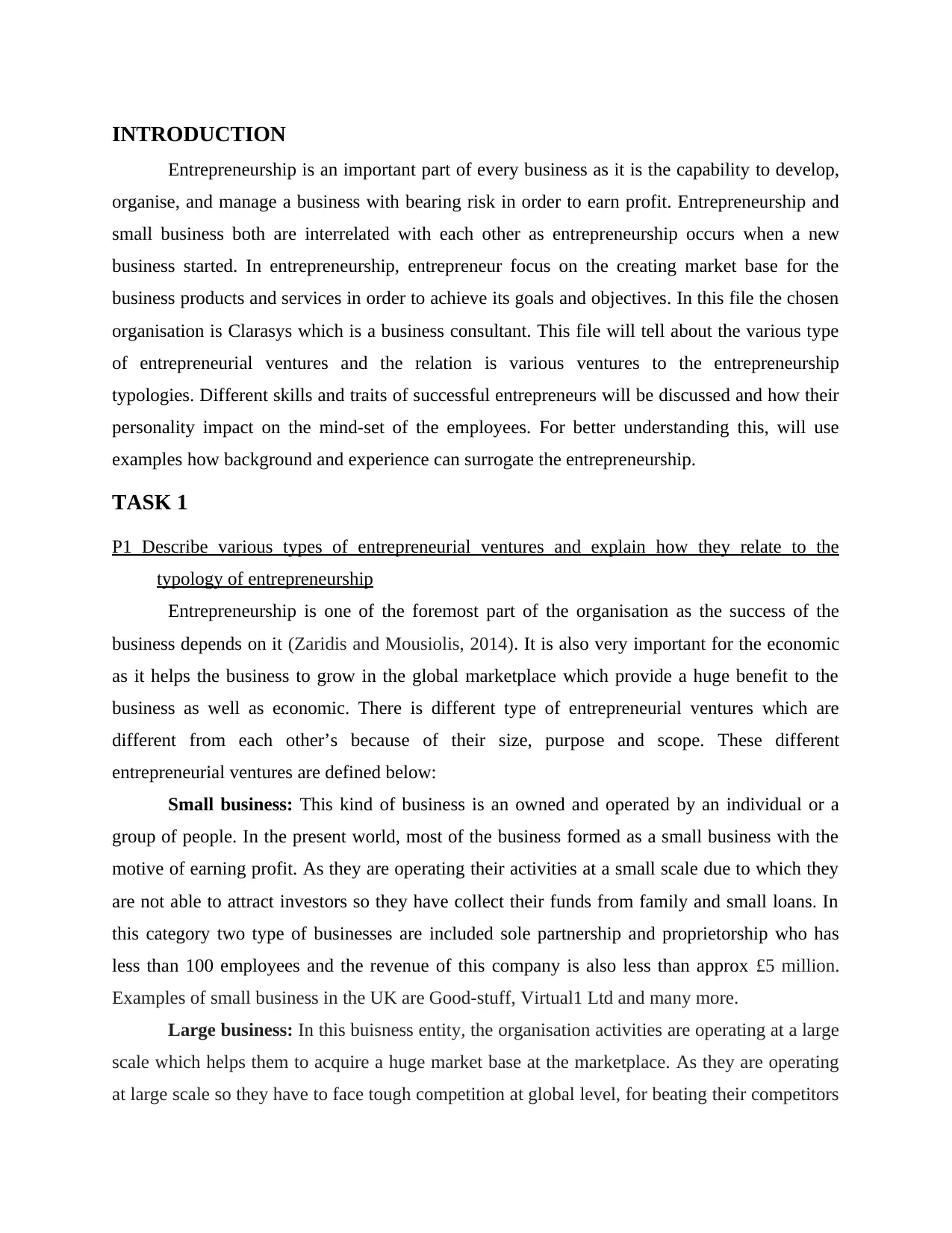
INTRODUCTION
Entrepreneurship is an important part of every business as it is the capability to develop,
organise, and manage a business with bearing risk in order to earn profit. Entrepreneurship and
small business both are interrelated with each other as entrepreneurship occurs when a new
business started. In entrepreneurship, entrepreneur focus on the creating market base for the
business products and services in order to achieve its goals and objectives. In this file the chosen
organisation is Clarasys which is a business consultant. This file will tell about the various type
of entrepreneurial ventures and the relation is various ventures to the entrepreneurship
typologies. Different skills and traits of successful entrepreneurs will be discussed and how their
personality impact on the mind-set of the employees. For better understanding this, will use
examples how background and experience can surrogate the entrepreneurship.
TASK 1
P1 Describe various types of entrepreneurial ventures and explain how they relate to the
typology of entrepreneurship
Entrepreneurship is one of the foremost part of the organisation as the success of the
business depends on it (Zaridis and Mousiolis, 2014). It is also very important for the economic
as it helps the business to grow in the global marketplace which provide a huge benefit to the
business as well as economic. There is different type of entrepreneurial ventures which are
different from each other’s because of their size, purpose and scope. These different
entrepreneurial ventures are defined below:
Small business: This kind of business is an owned and operated by an individual or a
group of people. In the present world, most of the business formed as a small business with the
motive of earning profit. As they are operating their activities at a small scale due to which they
are not able to attract investors so they have collect their funds from family and small loans. In
this category two type of businesses are included sole partnership and proprietorship who has
less than 100 employees and the revenue of this company is also less than approx £5 million.
Examples of small business in the UK are Good-stuff, Virtual1 Ltd and many more.
Large business: In this buisness entity, the organisation activities are operating at a large
scale which helps them to acquire a huge market base at the marketplace. As they are operating
at large scale so they have to face tough competition at global level, for beating their competitors
Entrepreneurship is an important part of every business as it is the capability to develop,
organise, and manage a business with bearing risk in order to earn profit. Entrepreneurship and
small business both are interrelated with each other as entrepreneurship occurs when a new
business started. In entrepreneurship, entrepreneur focus on the creating market base for the
business products and services in order to achieve its goals and objectives. In this file the chosen
organisation is Clarasys which is a business consultant. This file will tell about the various type
of entrepreneurial ventures and the relation is various ventures to the entrepreneurship
typologies. Different skills and traits of successful entrepreneurs will be discussed and how their
personality impact on the mind-set of the employees. For better understanding this, will use
examples how background and experience can surrogate the entrepreneurship.
TASK 1
P1 Describe various types of entrepreneurial ventures and explain how they relate to the
typology of entrepreneurship
Entrepreneurship is one of the foremost part of the organisation as the success of the
business depends on it (Zaridis and Mousiolis, 2014). It is also very important for the economic
as it helps the business to grow in the global marketplace which provide a huge benefit to the
business as well as economic. There is different type of entrepreneurial ventures which are
different from each other’s because of their size, purpose and scope. These different
entrepreneurial ventures are defined below:
Small business: This kind of business is an owned and operated by an individual or a
group of people. In the present world, most of the business formed as a small business with the
motive of earning profit. As they are operating their activities at a small scale due to which they
are not able to attract investors so they have collect their funds from family and small loans. In
this category two type of businesses are included sole partnership and proprietorship who has
less than 100 employees and the revenue of this company is also less than approx £5 million.
Examples of small business in the UK are Good-stuff, Virtual1 Ltd and many more.
Large business: In this buisness entity, the organisation activities are operating at a large
scale which helps them to acquire a huge market base at the marketplace. As they are operating
at large scale so they have to face tough competition at global level, for beating their competitors
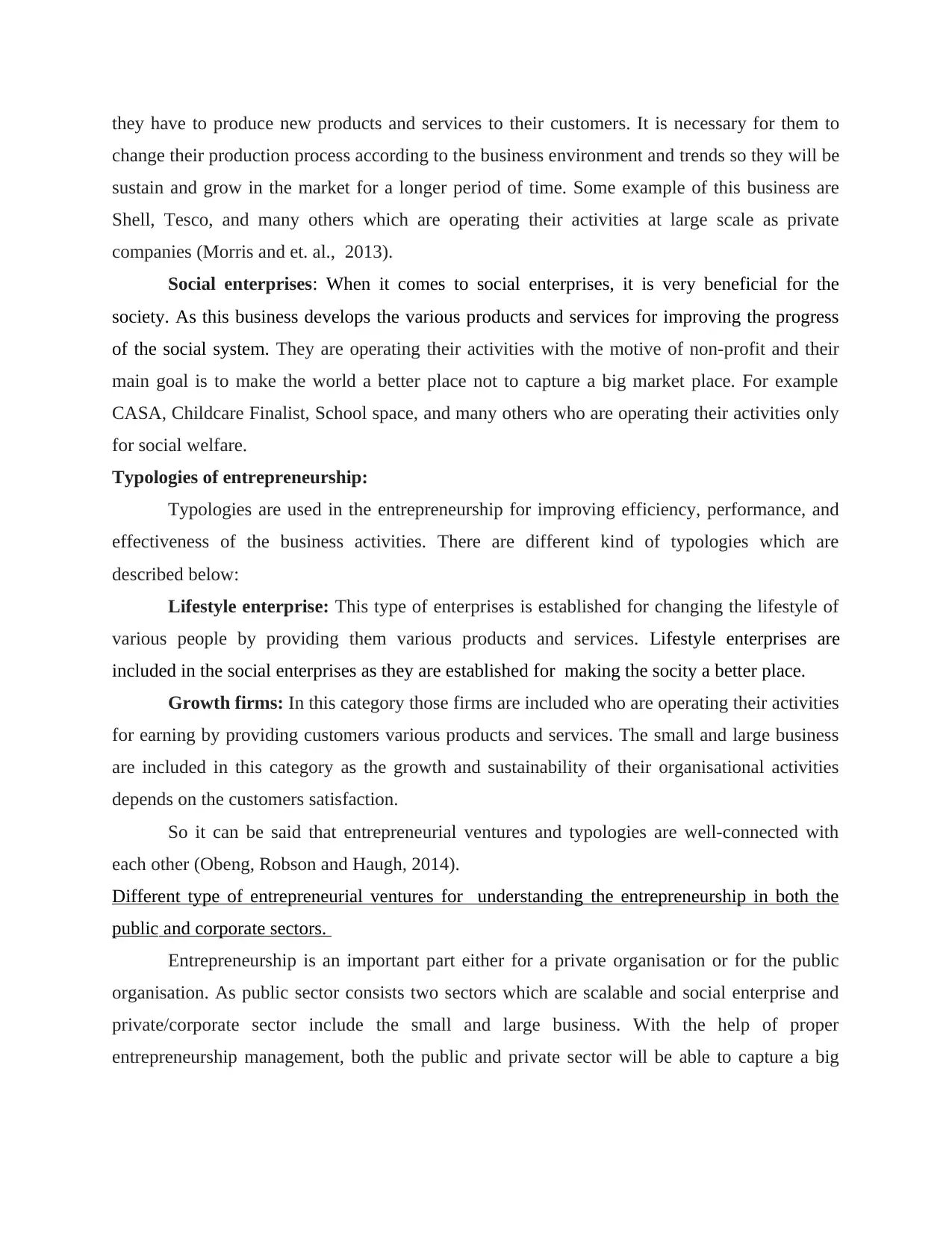
they have to produce new products and services to their customers. It is necessary for them to
change their production process according to the business environment and trends so they will be
sustain and grow in the market for a longer period of time. Some example of this business are
Shell, Tesco, and many others which are operating their activities at large scale as private
companies (Morris and et. al., 2013).
Social enterprises: When it comes to social enterprises, it is very beneficial for the
society. As this business develops the various products and services for improving the progress
of the social system. They are operating their activities with the motive of non-profit and their
main goal is to make the world a better place not to capture a big market place. For example
CASA, Childcare Finalist, School space, and many others who are operating their activities only
for social welfare.
Typologies of entrepreneurship:
Typologies are used in the entrepreneurship for improving efficiency, performance, and
effectiveness of the business activities. There are different kind of typologies which are
described below:
Lifestyle enterprise: This type of enterprises is established for changing the lifestyle of
various people by providing them various products and services. Lifestyle enterprises are
included in the social enterprises as they are established for making the socity a better place.
Growth firms: In this category those firms are included who are operating their activities
for earning by providing customers various products and services. The small and large business
are included in this category as the growth and sustainability of their organisational activities
depends on the customers satisfaction.
So it can be said that entrepreneurial ventures and typologies are well-connected with
each other (Obeng, Robson and Haugh, 2014).
Different type of entrepreneurial ventures for understanding the entrepreneurship in both the
public and corporate sectors.
Entrepreneurship is an important part either for a private organisation or for the public
organisation. As public sector consists two sectors which are scalable and social enterprise and
private/corporate sector include the small and large business. With the help of proper
entrepreneurship management, both the public and private sector will be able to capture a big
change their production process according to the business environment and trends so they will be
sustain and grow in the market for a longer period of time. Some example of this business are
Shell, Tesco, and many others which are operating their activities at large scale as private
companies (Morris and et. al., 2013).
Social enterprises: When it comes to social enterprises, it is very beneficial for the
society. As this business develops the various products and services for improving the progress
of the social system. They are operating their activities with the motive of non-profit and their
main goal is to make the world a better place not to capture a big market place. For example
CASA, Childcare Finalist, School space, and many others who are operating their activities only
for social welfare.
Typologies of entrepreneurship:
Typologies are used in the entrepreneurship for improving efficiency, performance, and
effectiveness of the business activities. There are different kind of typologies which are
described below:
Lifestyle enterprise: This type of enterprises is established for changing the lifestyle of
various people by providing them various products and services. Lifestyle enterprises are
included in the social enterprises as they are established for making the socity a better place.
Growth firms: In this category those firms are included who are operating their activities
for earning by providing customers various products and services. The small and large business
are included in this category as the growth and sustainability of their organisational activities
depends on the customers satisfaction.
So it can be said that entrepreneurial ventures and typologies are well-connected with
each other (Obeng, Robson and Haugh, 2014).
Different type of entrepreneurial ventures for understanding the entrepreneurship in both the
public and corporate sectors.
Entrepreneurship is an important part either for a private organisation or for the public
organisation. As public sector consists two sectors which are scalable and social enterprise and
private/corporate sector include the small and large business. With the help of proper
entrepreneurship management, both the public and private sector will be able to capture a big
Secure Best Marks with AI Grader
Need help grading? Try our AI Grader for instant feedback on your assignments.
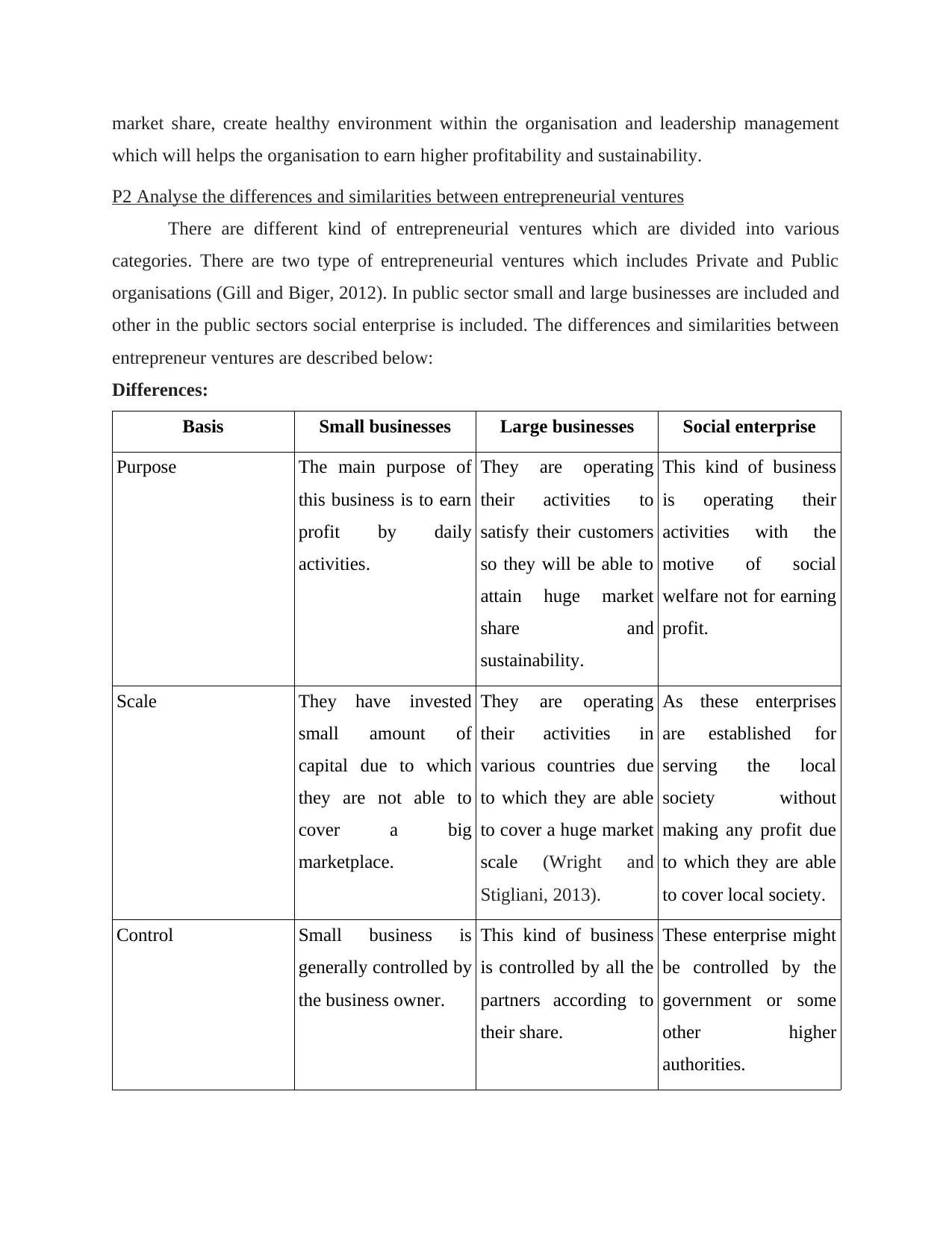
market share, create healthy environment within the organisation and leadership management
which will helps the organisation to earn higher profitability and sustainability.
P2 Analyse the differences and similarities between entrepreneurial ventures
There are different kind of entrepreneurial ventures which are divided into various
categories. There are two type of entrepreneurial ventures which includes Private and Public
organisations (Gill and Biger, 2012). In public sector small and large businesses are included and
other in the public sectors social enterprise is included. The differences and similarities between
entrepreneur ventures are described below:
Differences:
Basis Small businesses Large businesses Social enterprise
Purpose The main purpose of
this business is to earn
profit by daily
activities.
They are operating
their activities to
satisfy their customers
so they will be able to
attain huge market
share and
sustainability.
This kind of business
is operating their
activities with the
motive of social
welfare not for earning
profit.
Scale They have invested
small amount of
capital due to which
they are not able to
cover a big
marketplace.
They are operating
their activities in
various countries due
to which they are able
to cover a huge market
scale (Wright and
Stigliani, 2013).
As these enterprises
are established for
serving the local
society without
making any profit due
to which they are able
to cover local society.
Control Small business is
generally controlled by
the business owner.
This kind of business
is controlled by all the
partners according to
their share.
These enterprise might
be controlled by the
government or some
other higher
authorities.
which will helps the organisation to earn higher profitability and sustainability.
P2 Analyse the differences and similarities between entrepreneurial ventures
There are different kind of entrepreneurial ventures which are divided into various
categories. There are two type of entrepreneurial ventures which includes Private and Public
organisations (Gill and Biger, 2012). In public sector small and large businesses are included and
other in the public sectors social enterprise is included. The differences and similarities between
entrepreneur ventures are described below:
Differences:
Basis Small businesses Large businesses Social enterprise
Purpose The main purpose of
this business is to earn
profit by daily
activities.
They are operating
their activities to
satisfy their customers
so they will be able to
attain huge market
share and
sustainability.
This kind of business
is operating their
activities with the
motive of social
welfare not for earning
profit.
Scale They have invested
small amount of
capital due to which
they are not able to
cover a big
marketplace.
They are operating
their activities in
various countries due
to which they are able
to cover a huge market
scale (Wright and
Stigliani, 2013).
As these enterprises
are established for
serving the local
society without
making any profit due
to which they are able
to cover local society.
Control Small business is
generally controlled by
the business owner.
This kind of business
is controlled by all the
partners according to
their share.
These enterprise might
be controlled by the
government or some
other higher
authorities.
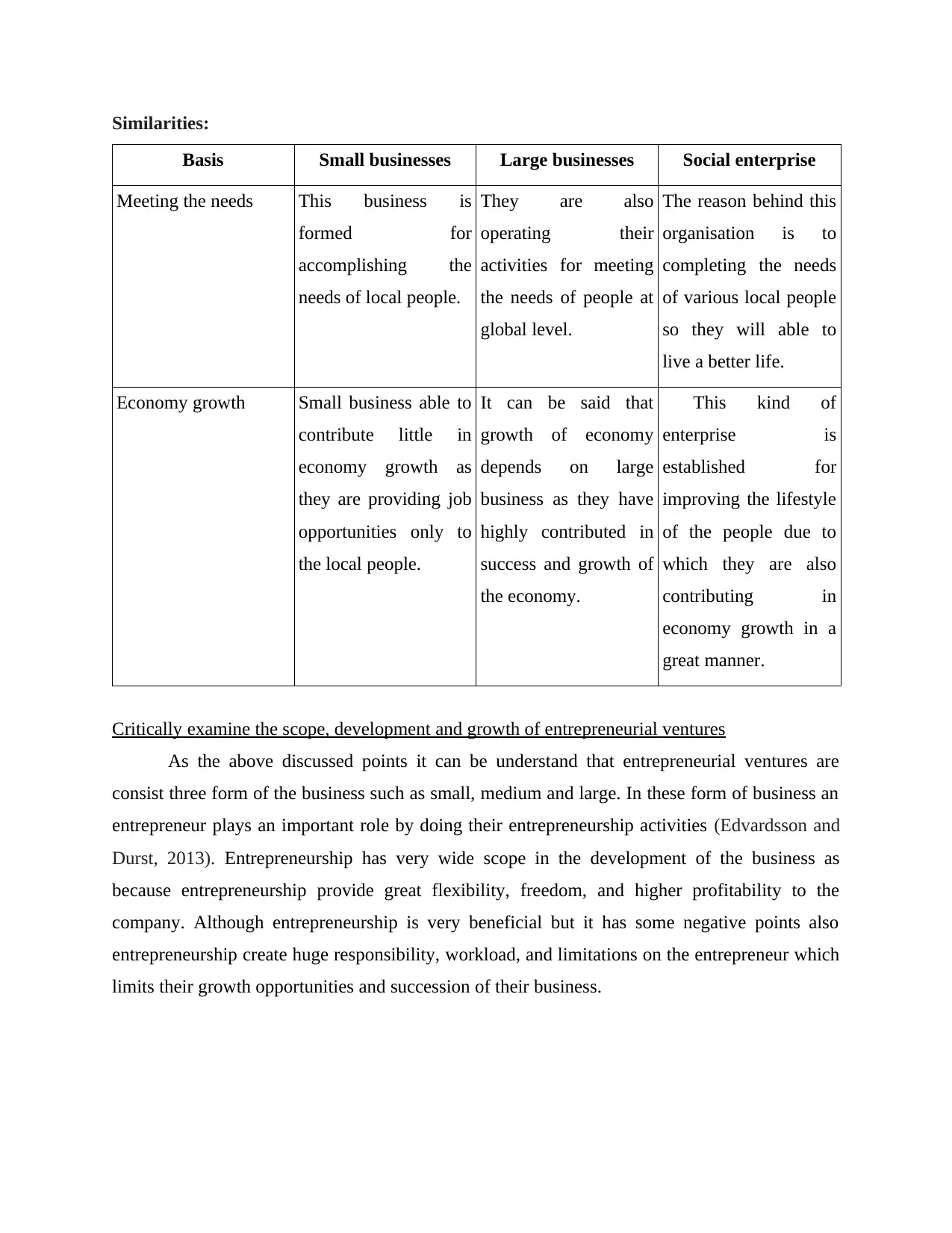
Similarities:
Basis Small businesses Large businesses Social enterprise
Meeting the needs This business is
formed for
accomplishing the
needs of local people.
They are also
operating their
activities for meeting
the needs of people at
global level.
The reason behind this
organisation is to
completing the needs
of various local people
so they will able to
live a better life.
Economy growth Small business able to
contribute little in
economy growth as
they are providing job
opportunities only to
the local people.
It can be said that
growth of economy
depends on large
business as they have
highly contributed in
success and growth of
the economy.
This kind of
enterprise is
established for
improving the lifestyle
of the people due to
which they are also
contributing in
economy growth in a
great manner.
Critically examine the scope, development and growth of entrepreneurial ventures
As the above discussed points it can be understand that entrepreneurial ventures are
consist three form of the business such as small, medium and large. In these form of business an
entrepreneur plays an important role by doing their entrepreneurship activities (Edvardsson and
Durst, 2013). Entrepreneurship has very wide scope in the development of the business as
because entrepreneurship provide great flexibility, freedom, and higher profitability to the
company. Although entrepreneurship is very beneficial but it has some negative points also
entrepreneurship create huge responsibility, workload, and limitations on the entrepreneur which
limits their growth opportunities and succession of their business.
Basis Small businesses Large businesses Social enterprise
Meeting the needs This business is
formed for
accomplishing the
needs of local people.
They are also
operating their
activities for meeting
the needs of people at
global level.
The reason behind this
organisation is to
completing the needs
of various local people
so they will able to
live a better life.
Economy growth Small business able to
contribute little in
economy growth as
they are providing job
opportunities only to
the local people.
It can be said that
growth of economy
depends on large
business as they have
highly contributed in
success and growth of
the economy.
This kind of
enterprise is
established for
improving the lifestyle
of the people due to
which they are also
contributing in
economy growth in a
great manner.
Critically examine the scope, development and growth of entrepreneurial ventures
As the above discussed points it can be understand that entrepreneurial ventures are
consist three form of the business such as small, medium and large. In these form of business an
entrepreneur plays an important role by doing their entrepreneurship activities (Edvardsson and
Durst, 2013). Entrepreneurship has very wide scope in the development of the business as
because entrepreneurship provide great flexibility, freedom, and higher profitability to the
company. Although entrepreneurship is very beneficial but it has some negative points also
entrepreneurship create huge responsibility, workload, and limitations on the entrepreneur which
limits their growth opportunities and succession of their business.
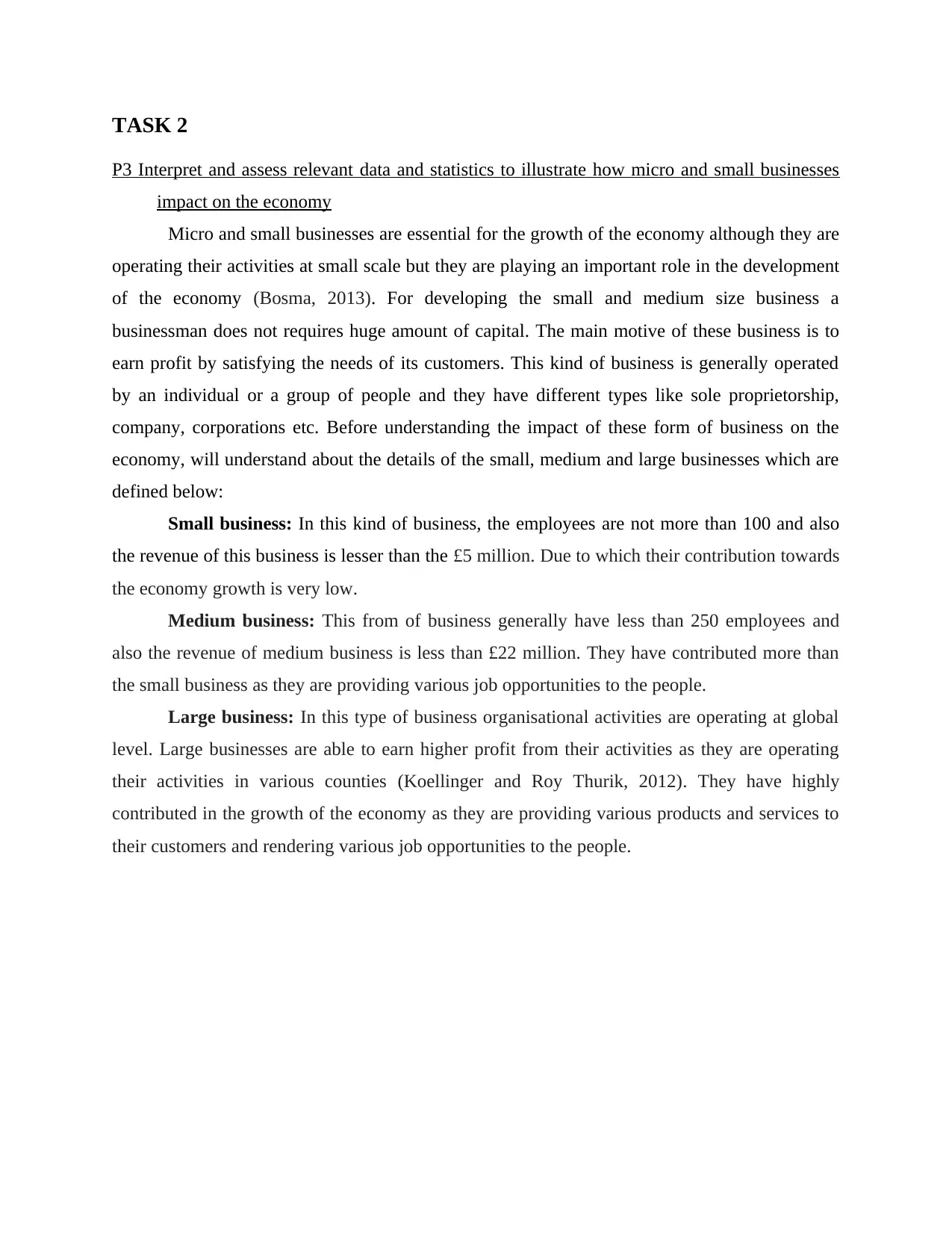
TASK 2
P3 Interpret and assess relevant data and statistics to illustrate how micro and small businesses
impact on the economy
Micro and small businesses are essential for the growth of the economy although they are
operating their activities at small scale but they are playing an important role in the development
of the economy (Bosma, 2013). For developing the small and medium size business a
businessman does not requires huge amount of capital. The main motive of these business is to
earn profit by satisfying the needs of its customers. This kind of business is generally operated
by an individual or a group of people and they have different types like sole proprietorship,
company, corporations etc. Before understanding the impact of these form of business on the
economy, will understand about the details of the small, medium and large businesses which are
defined below:
Small business: In this kind of business, the employees are not more than 100 and also
the revenue of this business is lesser than the £5 million. Due to which their contribution towards
the economy growth is very low.
Medium business: This from of business generally have less than 250 employees and
also the revenue of medium business is less than £22 million. They have contributed more than
the small business as they are providing various job opportunities to the people.
Large business: In this type of business organisational activities are operating at global
level. Large businesses are able to earn higher profit from their activities as they are operating
their activities in various counties (Koellinger and Roy Thurik, 2012). They have highly
contributed in the growth of the economy as they are providing various products and services to
their customers and rendering various job opportunities to the people.
P3 Interpret and assess relevant data and statistics to illustrate how micro and small businesses
impact on the economy
Micro and small businesses are essential for the growth of the economy although they are
operating their activities at small scale but they are playing an important role in the development
of the economy (Bosma, 2013). For developing the small and medium size business a
businessman does not requires huge amount of capital. The main motive of these business is to
earn profit by satisfying the needs of its customers. This kind of business is generally operated
by an individual or a group of people and they have different types like sole proprietorship,
company, corporations etc. Before understanding the impact of these form of business on the
economy, will understand about the details of the small, medium and large businesses which are
defined below:
Small business: In this kind of business, the employees are not more than 100 and also
the revenue of this business is lesser than the £5 million. Due to which their contribution towards
the economy growth is very low.
Medium business: This from of business generally have less than 250 employees and
also the revenue of medium business is less than £22 million. They have contributed more than
the small business as they are providing various job opportunities to the people.
Large business: In this type of business organisational activities are operating at global
level. Large businesses are able to earn higher profit from their activities as they are operating
their activities in various counties (Koellinger and Roy Thurik, 2012). They have highly
contributed in the growth of the economy as they are providing various products and services to
their customers and rendering various job opportunities to the people.
Paraphrase This Document
Need a fresh take? Get an instant paraphrase of this document with our AI Paraphraser
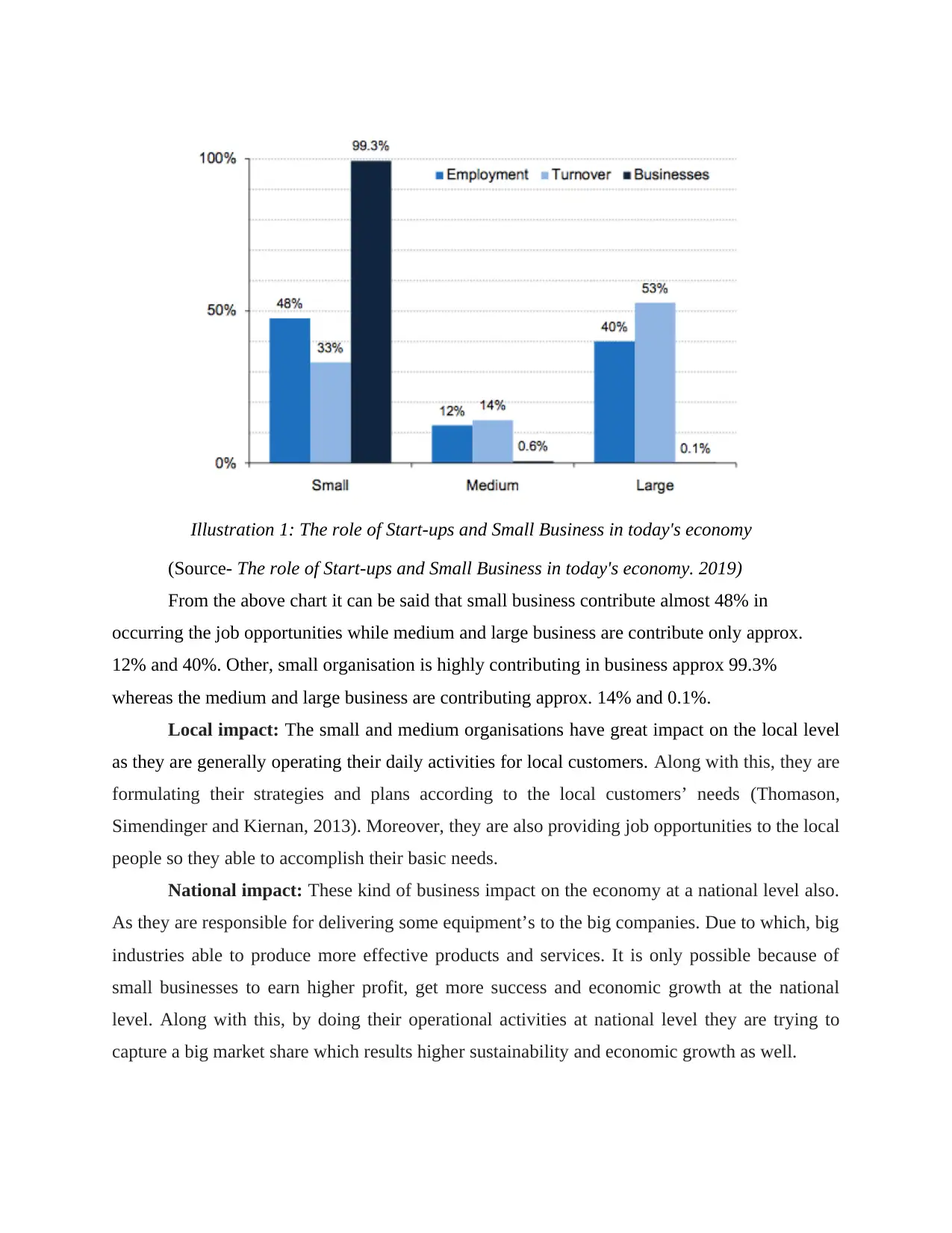
Illustration 1: The role of Start-ups and Small Business in today's economy
(Source- The role of Start-ups and Small Business in today's economy. 2019)
From the above chart it can be said that small business contribute almost 48% in
occurring the job opportunities while medium and large business are contribute only approx.
12% and 40%. Other, small organisation is highly contributing in business approx 99.3%
whereas the medium and large business are contributing approx. 14% and 0.1%.
Local impact: The small and medium organisations have great impact on the local level
as they are generally operating their daily activities for local customers. Along with this, they are
formulating their strategies and plans according to the local customers’ needs (Thomason,
Simendinger and Kiernan, 2013). Moreover, they are also providing job opportunities to the local
people so they able to accomplish their basic needs.
National impact: These kind of business impact on the economy at a national level also.
As they are responsible for delivering some equipment’s to the big companies. Due to which, big
industries able to produce more effective products and services. It is only possible because of
small businesses to earn higher profit, get more success and economic growth at the national
level. Along with this, by doing their operational activities at national level they are trying to
capture a big market share which results higher sustainability and economic growth as well.
(Source- The role of Start-ups and Small Business in today's economy. 2019)
From the above chart it can be said that small business contribute almost 48% in
occurring the job opportunities while medium and large business are contribute only approx.
12% and 40%. Other, small organisation is highly contributing in business approx 99.3%
whereas the medium and large business are contributing approx. 14% and 0.1%.
Local impact: The small and medium organisations have great impact on the local level
as they are generally operating their daily activities for local customers. Along with this, they are
formulating their strategies and plans according to the local customers’ needs (Thomason,
Simendinger and Kiernan, 2013). Moreover, they are also providing job opportunities to the local
people so they able to accomplish their basic needs.
National impact: These kind of business impact on the economy at a national level also.
As they are responsible for delivering some equipment’s to the big companies. Due to which, big
industries able to produce more effective products and services. It is only possible because of
small businesses to earn higher profit, get more success and economic growth at the national
level. Along with this, by doing their operational activities at national level they are trying to
capture a big market share which results higher sustainability and economic growth as well.
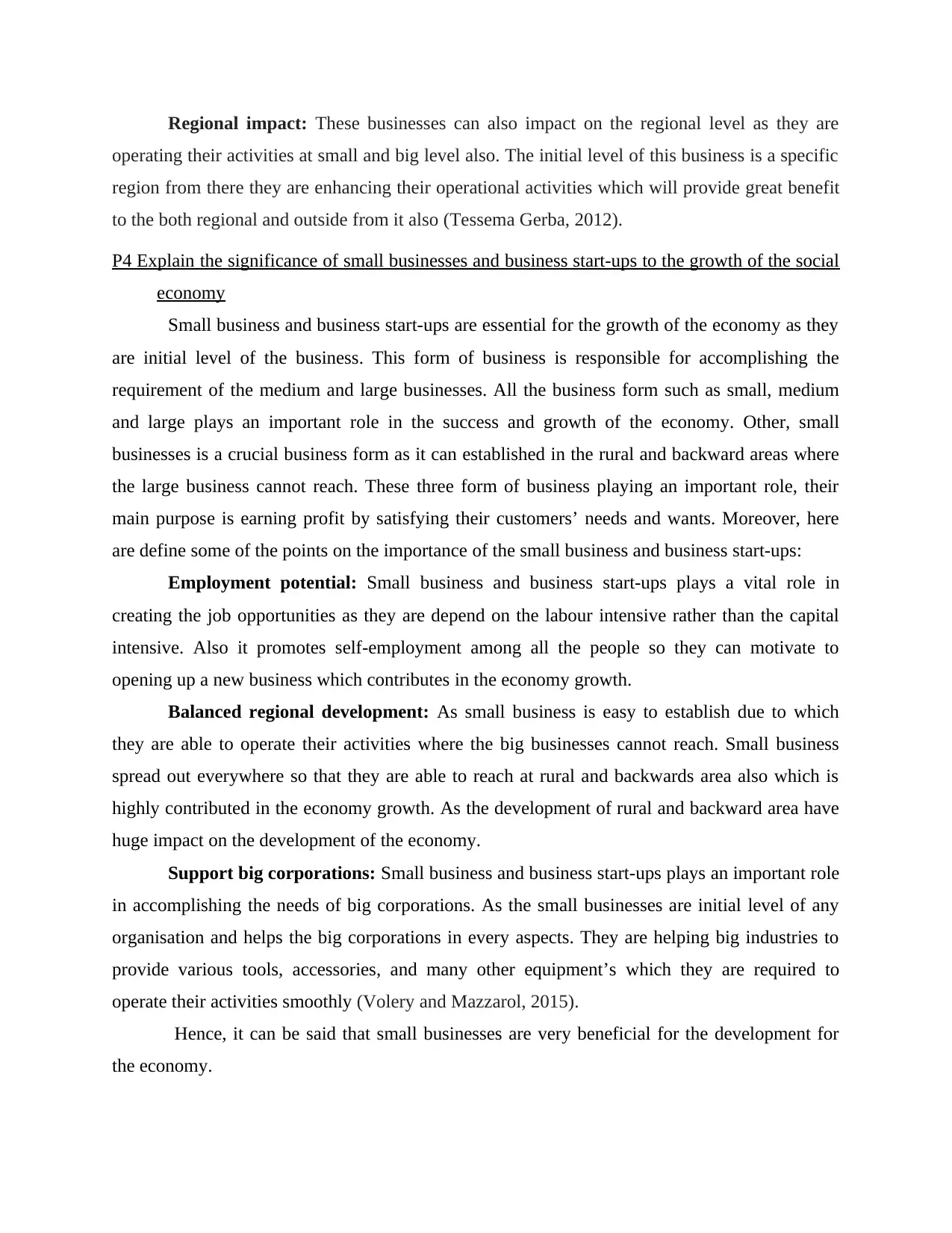
Regional impact: These businesses can also impact on the regional level as they are
operating their activities at small and big level also. The initial level of this business is a specific
region from there they are enhancing their operational activities which will provide great benefit
to the both regional and outside from it also (Tessema Gerba, 2012).
P4 Explain the significance of small businesses and business start-ups to the growth of the social
economy
Small business and business start-ups are essential for the growth of the economy as they
are initial level of the business. This form of business is responsible for accomplishing the
requirement of the medium and large businesses. All the business form such as small, medium
and large plays an important role in the success and growth of the economy. Other, small
businesses is a crucial business form as it can established in the rural and backward areas where
the large business cannot reach. These three form of business playing an important role, their
main purpose is earning profit by satisfying their customers’ needs and wants. Moreover, here
are define some of the points on the importance of the small business and business start-ups:
Employment potential: Small business and business start-ups plays a vital role in
creating the job opportunities as they are depend on the labour intensive rather than the capital
intensive. Also it promotes self-employment among all the people so they can motivate to
opening up a new business which contributes in the economy growth.
Balanced regional development: As small business is easy to establish due to which
they are able to operate their activities where the big businesses cannot reach. Small business
spread out everywhere so that they are able to reach at rural and backwards area also which is
highly contributed in the economy growth. As the development of rural and backward area have
huge impact on the development of the economy.
Support big corporations: Small business and business start-ups plays an important role
in accomplishing the needs of big corporations. As the small businesses are initial level of any
organisation and helps the big corporations in every aspects. They are helping big industries to
provide various tools, accessories, and many other equipment’s which they are required to
operate their activities smoothly (Volery and Mazzarol, 2015).
Hence, it can be said that small businesses are very beneficial for the development for
the economy.
operating their activities at small and big level also. The initial level of this business is a specific
region from there they are enhancing their operational activities which will provide great benefit
to the both regional and outside from it also (Tessema Gerba, 2012).
P4 Explain the significance of small businesses and business start-ups to the growth of the social
economy
Small business and business start-ups are essential for the growth of the economy as they
are initial level of the business. This form of business is responsible for accomplishing the
requirement of the medium and large businesses. All the business form such as small, medium
and large plays an important role in the success and growth of the economy. Other, small
businesses is a crucial business form as it can established in the rural and backward areas where
the large business cannot reach. These three form of business playing an important role, their
main purpose is earning profit by satisfying their customers’ needs and wants. Moreover, here
are define some of the points on the importance of the small business and business start-ups:
Employment potential: Small business and business start-ups plays a vital role in
creating the job opportunities as they are depend on the labour intensive rather than the capital
intensive. Also it promotes self-employment among all the people so they can motivate to
opening up a new business which contributes in the economy growth.
Balanced regional development: As small business is easy to establish due to which
they are able to operate their activities where the big businesses cannot reach. Small business
spread out everywhere so that they are able to reach at rural and backwards area also which is
highly contributed in the economy growth. As the development of rural and backward area have
huge impact on the development of the economy.
Support big corporations: Small business and business start-ups plays an important role
in accomplishing the needs of big corporations. As the small businesses are initial level of any
organisation and helps the big corporations in every aspects. They are helping big industries to
provide various tools, accessories, and many other equipment’s which they are required to
operate their activities smoothly (Volery and Mazzarol, 2015).
Hence, it can be said that small businesses are very beneficial for the development for
the economy.
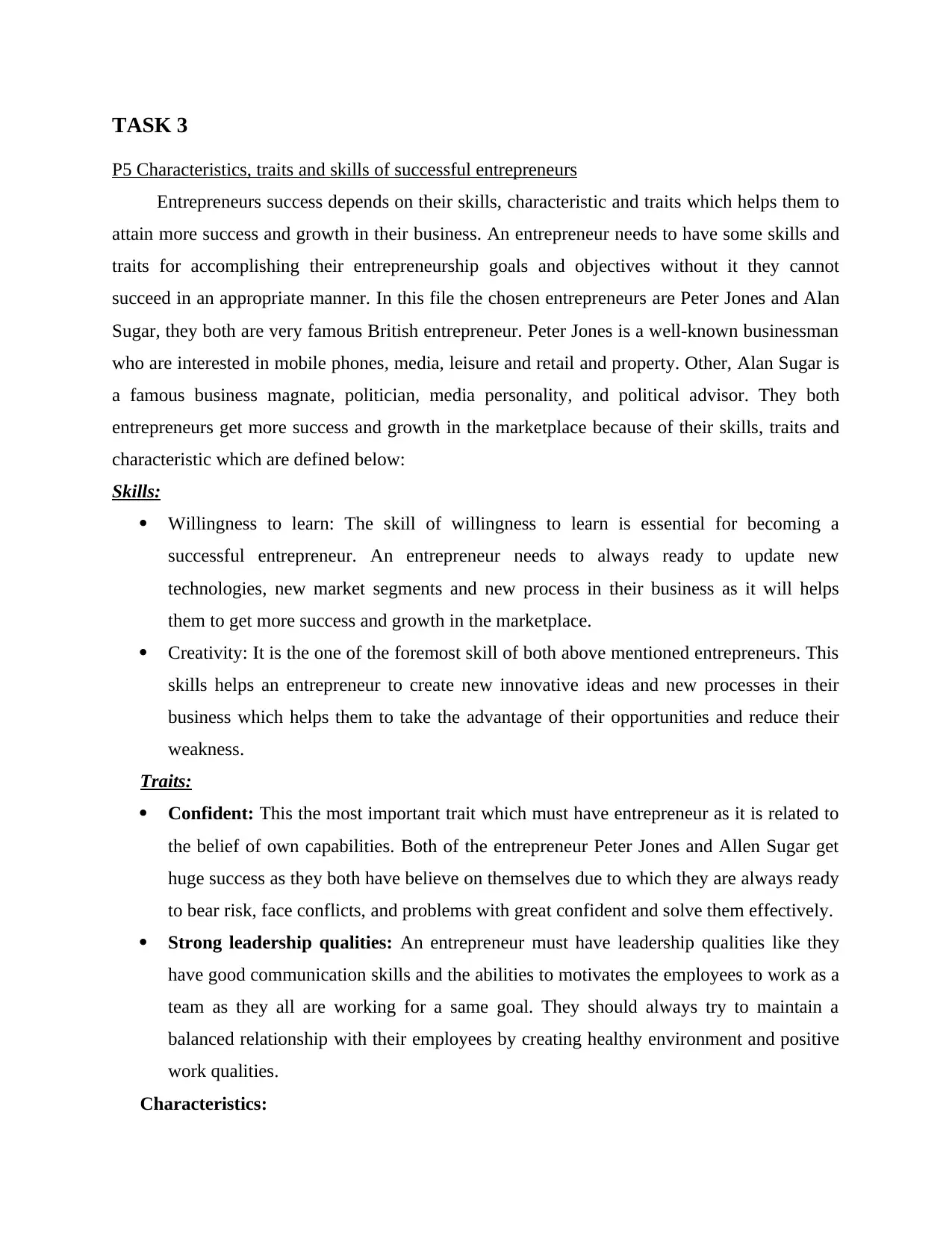
TASK 3
P5 Characteristics, traits and skills of successful entrepreneurs
Entrepreneurs success depends on their skills, characteristic and traits which helps them to
attain more success and growth in their business. An entrepreneur needs to have some skills and
traits for accomplishing their entrepreneurship goals and objectives without it they cannot
succeed in an appropriate manner. In this file the chosen entrepreneurs are Peter Jones and Alan
Sugar, they both are very famous British entrepreneur. Peter Jones is a well-known businessman
who are interested in mobile phones, media, leisure and retail and property. Other, Alan Sugar is
a famous business magnate, politician, media personality, and political advisor. They both
entrepreneurs get more success and growth in the marketplace because of their skills, traits and
characteristic which are defined below:
Skills:
Willingness to learn: The skill of willingness to learn is essential for becoming a
successful entrepreneur. An entrepreneur needs to always ready to update new
technologies, new market segments and new process in their business as it will helps
them to get more success and growth in the marketplace.
Creativity: It is the one of the foremost skill of both above mentioned entrepreneurs. This
skills helps an entrepreneur to create new innovative ideas and new processes in their
business which helps them to take the advantage of their opportunities and reduce their
weakness.
Traits:
Confident: This the most important trait which must have entrepreneur as it is related to
the belief of own capabilities. Both of the entrepreneur Peter Jones and Allen Sugar get
huge success as they both have believe on themselves due to which they are always ready
to bear risk, face conflicts, and problems with great confident and solve them effectively.
Strong leadership qualities: An entrepreneur must have leadership qualities like they
have good communication skills and the abilities to motivates the employees to work as a
team as they all are working for a same goal. They should always try to maintain a
balanced relationship with their employees by creating healthy environment and positive
work qualities.
Characteristics:
P5 Characteristics, traits and skills of successful entrepreneurs
Entrepreneurs success depends on their skills, characteristic and traits which helps them to
attain more success and growth in their business. An entrepreneur needs to have some skills and
traits for accomplishing their entrepreneurship goals and objectives without it they cannot
succeed in an appropriate manner. In this file the chosen entrepreneurs are Peter Jones and Alan
Sugar, they both are very famous British entrepreneur. Peter Jones is a well-known businessman
who are interested in mobile phones, media, leisure and retail and property. Other, Alan Sugar is
a famous business magnate, politician, media personality, and political advisor. They both
entrepreneurs get more success and growth in the marketplace because of their skills, traits and
characteristic which are defined below:
Skills:
Willingness to learn: The skill of willingness to learn is essential for becoming a
successful entrepreneur. An entrepreneur needs to always ready to update new
technologies, new market segments and new process in their business as it will helps
them to get more success and growth in the marketplace.
Creativity: It is the one of the foremost skill of both above mentioned entrepreneurs. This
skills helps an entrepreneur to create new innovative ideas and new processes in their
business which helps them to take the advantage of their opportunities and reduce their
weakness.
Traits:
Confident: This the most important trait which must have entrepreneur as it is related to
the belief of own capabilities. Both of the entrepreneur Peter Jones and Allen Sugar get
huge success as they both have believe on themselves due to which they are always ready
to bear risk, face conflicts, and problems with great confident and solve them effectively.
Strong leadership qualities: An entrepreneur must have leadership qualities like they
have good communication skills and the abilities to motivates the employees to work as a
team as they all are working for a same goal. They should always try to maintain a
balanced relationship with their employees by creating healthy environment and positive
work qualities.
Characteristics:
Secure Best Marks with AI Grader
Need help grading? Try our AI Grader for instant feedback on your assignments.
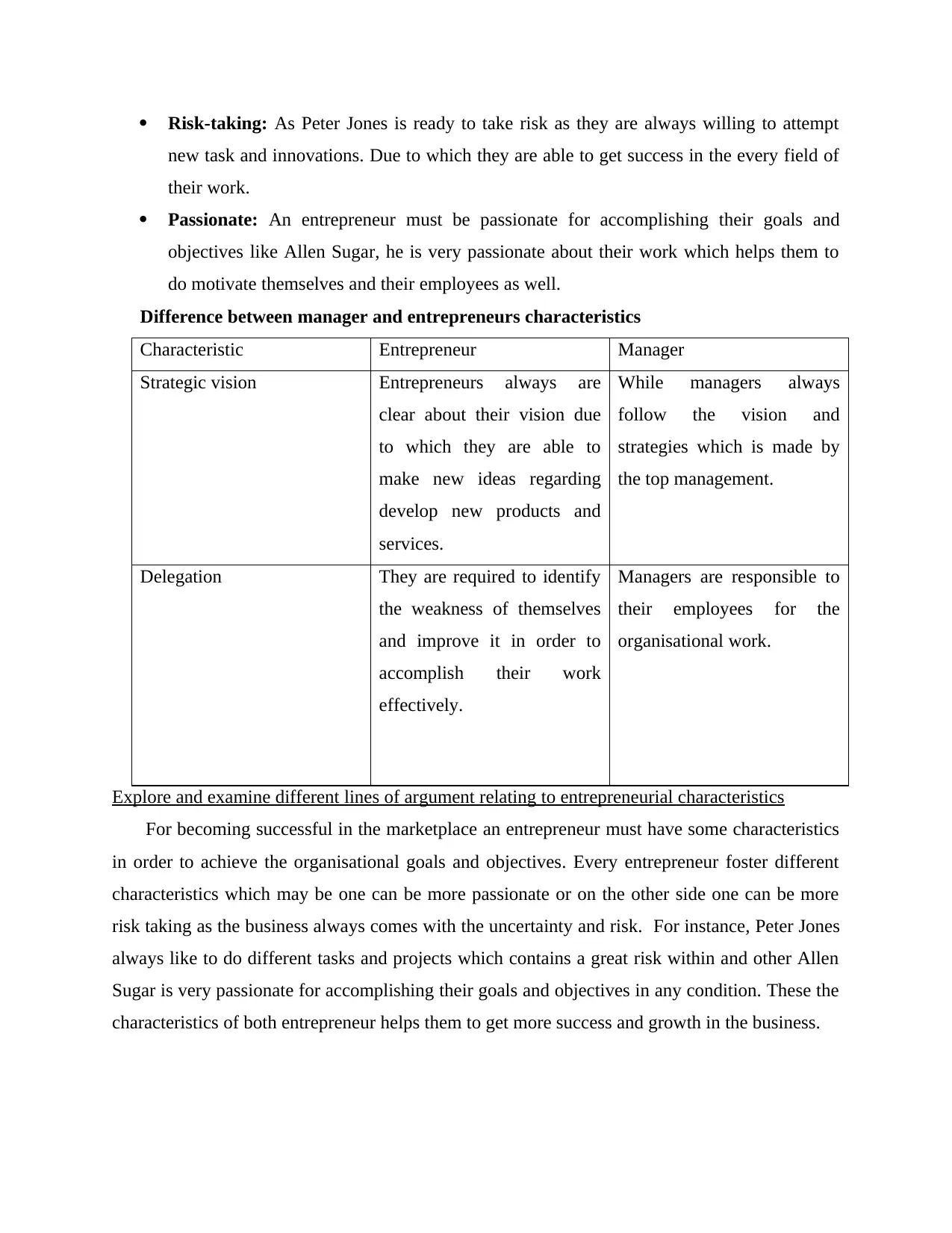
Risk-taking: As Peter Jones is ready to take risk as they are always willing to attempt
new task and innovations. Due to which they are able to get success in the every field of
their work.
Passionate: An entrepreneur must be passionate for accomplishing their goals and
objectives like Allen Sugar, he is very passionate about their work which helps them to
do motivate themselves and their employees as well.
Difference between manager and entrepreneurs characteristics
Characteristic Entrepreneur Manager
Strategic vision Entrepreneurs always are
clear about their vision due
to which they are able to
make new ideas regarding
develop new products and
services.
While managers always
follow the vision and
strategies which is made by
the top management.
Delegation They are required to identify
the weakness of themselves
and improve it in order to
accomplish their work
effectively.
Managers are responsible to
their employees for the
organisational work.
Explore and examine different lines of argument relating to entrepreneurial characteristics
For becoming successful in the marketplace an entrepreneur must have some characteristics
in order to achieve the organisational goals and objectives. Every entrepreneur foster different
characteristics which may be one can be more passionate or on the other side one can be more
risk taking as the business always comes with the uncertainty and risk. For instance, Peter Jones
always like to do different tasks and projects which contains a great risk within and other Allen
Sugar is very passionate for accomplishing their goals and objectives in any condition. These the
characteristics of both entrepreneur helps them to get more success and growth in the business.
new task and innovations. Due to which they are able to get success in the every field of
their work.
Passionate: An entrepreneur must be passionate for accomplishing their goals and
objectives like Allen Sugar, he is very passionate about their work which helps them to
do motivate themselves and their employees as well.
Difference between manager and entrepreneurs characteristics
Characteristic Entrepreneur Manager
Strategic vision Entrepreneurs always are
clear about their vision due
to which they are able to
make new ideas regarding
develop new products and
services.
While managers always
follow the vision and
strategies which is made by
the top management.
Delegation They are required to identify
the weakness of themselves
and improve it in order to
accomplish their work
effectively.
Managers are responsible to
their employees for the
organisational work.
Explore and examine different lines of argument relating to entrepreneurial characteristics
For becoming successful in the marketplace an entrepreneur must have some characteristics
in order to achieve the organisational goals and objectives. Every entrepreneur foster different
characteristics which may be one can be more passionate or on the other side one can be more
risk taking as the business always comes with the uncertainty and risk. For instance, Peter Jones
always like to do different tasks and projects which contains a great risk within and other Allen
Sugar is very passionate for accomplishing their goals and objectives in any condition. These the
characteristics of both entrepreneur helps them to get more success and growth in the business.
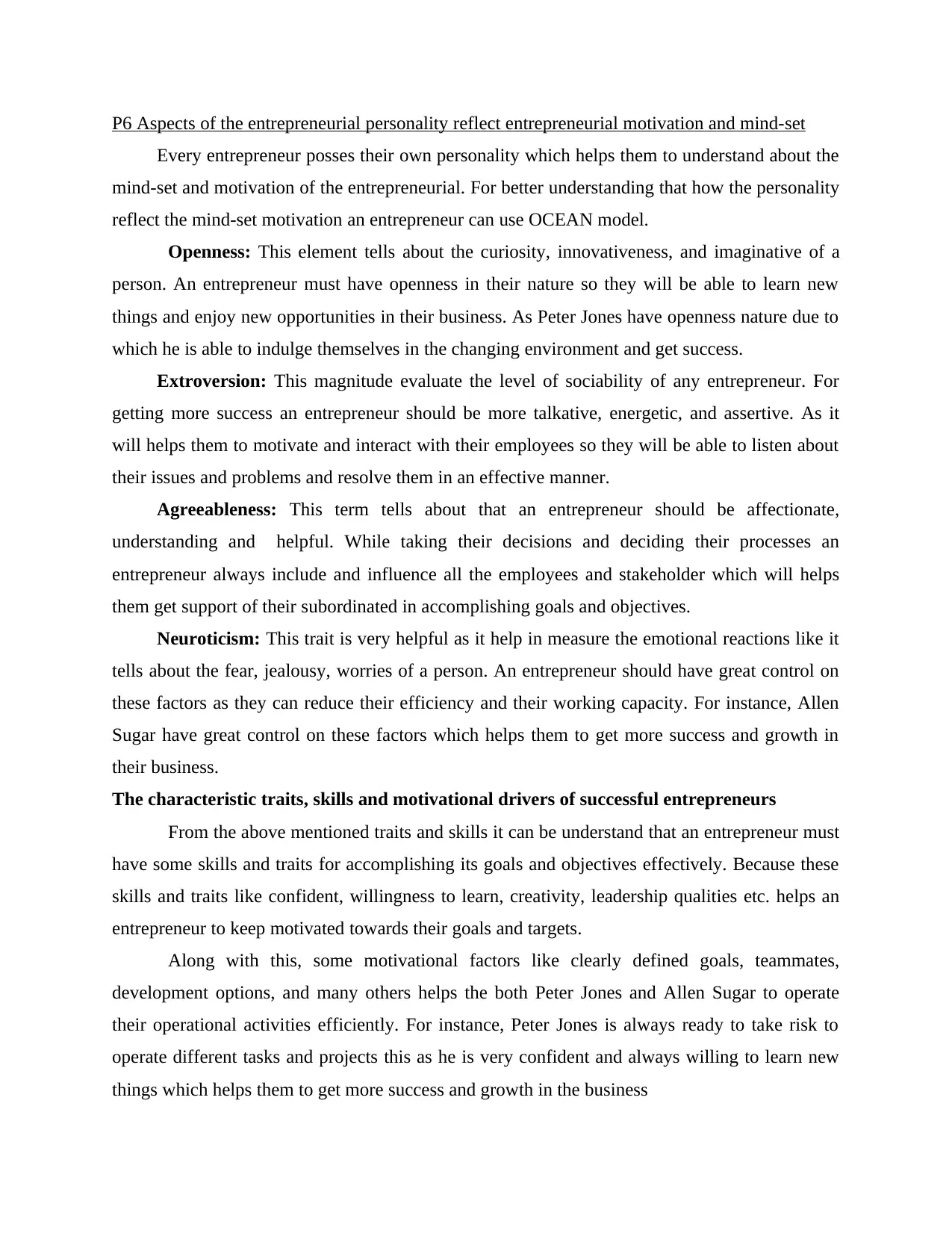
P6 Aspects of the entrepreneurial personality reflect entrepreneurial motivation and mind-set
Every entrepreneur posses their own personality which helps them to understand about the
mind-set and motivation of the entrepreneurial. For better understanding that how the personality
reflect the mind-set motivation an entrepreneur can use OCEAN model.
Openness: This element tells about the curiosity, innovativeness, and imaginative of a
person. An entrepreneur must have openness in their nature so they will be able to learn new
things and enjoy new opportunities in their business. As Peter Jones have openness nature due to
which he is able to indulge themselves in the changing environment and get success.
Extroversion: This magnitude evaluate the level of sociability of any entrepreneur. For
getting more success an entrepreneur should be more talkative, energetic, and assertive. As it
will helps them to motivate and interact with their employees so they will be able to listen about
their issues and problems and resolve them in an effective manner.
Agreeableness: This term tells about that an entrepreneur should be affectionate,
understanding and helpful. While taking their decisions and deciding their processes an
entrepreneur always include and influence all the employees and stakeholder which will helps
them get support of their subordinated in accomplishing goals and objectives.
Neuroticism: This trait is very helpful as it help in measure the emotional reactions like it
tells about the fear, jealousy, worries of a person. An entrepreneur should have great control on
these factors as they can reduce their efficiency and their working capacity. For instance, Allen
Sugar have great control on these factors which helps them to get more success and growth in
their business.
The characteristic traits, skills and motivational drivers of successful entrepreneurs
From the above mentioned traits and skills it can be understand that an entrepreneur must
have some skills and traits for accomplishing its goals and objectives effectively. Because these
skills and traits like confident, willingness to learn, creativity, leadership qualities etc. helps an
entrepreneur to keep motivated towards their goals and targets.
Along with this, some motivational factors like clearly defined goals, teammates,
development options, and many others helps the both Peter Jones and Allen Sugar to operate
their operational activities efficiently. For instance, Peter Jones is always ready to take risk to
operate different tasks and projects this as he is very confident and always willing to learn new
things which helps them to get more success and growth in the business
Every entrepreneur posses their own personality which helps them to understand about the
mind-set and motivation of the entrepreneurial. For better understanding that how the personality
reflect the mind-set motivation an entrepreneur can use OCEAN model.
Openness: This element tells about the curiosity, innovativeness, and imaginative of a
person. An entrepreneur must have openness in their nature so they will be able to learn new
things and enjoy new opportunities in their business. As Peter Jones have openness nature due to
which he is able to indulge themselves in the changing environment and get success.
Extroversion: This magnitude evaluate the level of sociability of any entrepreneur. For
getting more success an entrepreneur should be more talkative, energetic, and assertive. As it
will helps them to motivate and interact with their employees so they will be able to listen about
their issues and problems and resolve them in an effective manner.
Agreeableness: This term tells about that an entrepreneur should be affectionate,
understanding and helpful. While taking their decisions and deciding their processes an
entrepreneur always include and influence all the employees and stakeholder which will helps
them get support of their subordinated in accomplishing goals and objectives.
Neuroticism: This trait is very helpful as it help in measure the emotional reactions like it
tells about the fear, jealousy, worries of a person. An entrepreneur should have great control on
these factors as they can reduce their efficiency and their working capacity. For instance, Allen
Sugar have great control on these factors which helps them to get more success and growth in
their business.
The characteristic traits, skills and motivational drivers of successful entrepreneurs
From the above mentioned traits and skills it can be understand that an entrepreneur must
have some skills and traits for accomplishing its goals and objectives effectively. Because these
skills and traits like confident, willingness to learn, creativity, leadership qualities etc. helps an
entrepreneur to keep motivated towards their goals and targets.
Along with this, some motivational factors like clearly defined goals, teammates,
development options, and many others helps the both Peter Jones and Allen Sugar to operate
their operational activities efficiently. For instance, Peter Jones is always ready to take risk to
operate different tasks and projects this as he is very confident and always willing to learn new
things which helps them to get more success and growth in the business

TASK 4
P7 Background and experience can hinder or foster entrepreneurship
Background and experience is a major part of any entrepreneur as the success and failure
of them depends on it. As if an entrepreneur have good knowledge and good background then
they can get more successful in the marketplace. For better understanding this, here are taking
two examples which are defined below:-
Peter Jones
Background: He was born on 18th march 1966 in Berkshire, England. His father was an
air conditioning engineer and has a small office at Windsor. At the age of 22 he got married to
Caroline.
Experience: In his earlier age he earned by giving tennis lessons after sometimes in mid-
twenties he started manufacturing PCs. In At the age of 28, Jones started working Siemens
Nixdorf that was a British computer business.
Allen Sugar
Background: He was born on 24th march 1947 in Hackney, London. He belongs from a
poor family so he has to earned his pocket money from working with a greengrocer.
Experience: At the age of 21 he was formed a company Amstrad which was dealing in the
consumers electronics. Then he get more success because of this company in 1980s and in the
2007 it was sold to broadcaster BSkyB. After this he was appearing on BBC reality show The
Apprentice, form this he got more success and now he is a famous entrepreneur and media
person.
Impact of Background and Experience on entrepreneur
Positive impact: Above mentioned both entrepreneurs have to face various challenges
due to their financial condition but they had considered these problems as motivational tools.
Because of their challenging past they are able to motivate themselves and create new ideas and
innovations which lead them in a higher positron and achieve great success.
Negative impact: These both entrepreneurs was not able to attain proper academic experience
and have to face financial crisis due to which they were not able to get success in their earlier age
so they have to do more struggle for getting success.
The link between entrepreneurial characteristics and the influence of personal background and
experience
P7 Background and experience can hinder or foster entrepreneurship
Background and experience is a major part of any entrepreneur as the success and failure
of them depends on it. As if an entrepreneur have good knowledge and good background then
they can get more successful in the marketplace. For better understanding this, here are taking
two examples which are defined below:-
Peter Jones
Background: He was born on 18th march 1966 in Berkshire, England. His father was an
air conditioning engineer and has a small office at Windsor. At the age of 22 he got married to
Caroline.
Experience: In his earlier age he earned by giving tennis lessons after sometimes in mid-
twenties he started manufacturing PCs. In At the age of 28, Jones started working Siemens
Nixdorf that was a British computer business.
Allen Sugar
Background: He was born on 24th march 1947 in Hackney, London. He belongs from a
poor family so he has to earned his pocket money from working with a greengrocer.
Experience: At the age of 21 he was formed a company Amstrad which was dealing in the
consumers electronics. Then he get more success because of this company in 1980s and in the
2007 it was sold to broadcaster BSkyB. After this he was appearing on BBC reality show The
Apprentice, form this he got more success and now he is a famous entrepreneur and media
person.
Impact of Background and Experience on entrepreneur
Positive impact: Above mentioned both entrepreneurs have to face various challenges
due to their financial condition but they had considered these problems as motivational tools.
Because of their challenging past they are able to motivate themselves and create new ideas and
innovations which lead them in a higher positron and achieve great success.
Negative impact: These both entrepreneurs was not able to attain proper academic experience
and have to face financial crisis due to which they were not able to get success in their earlier age
so they have to do more struggle for getting success.
The link between entrepreneurial characteristics and the influence of personal background and
experience
Paraphrase This Document
Need a fresh take? Get an instant paraphrase of this document with our AI Paraphraser
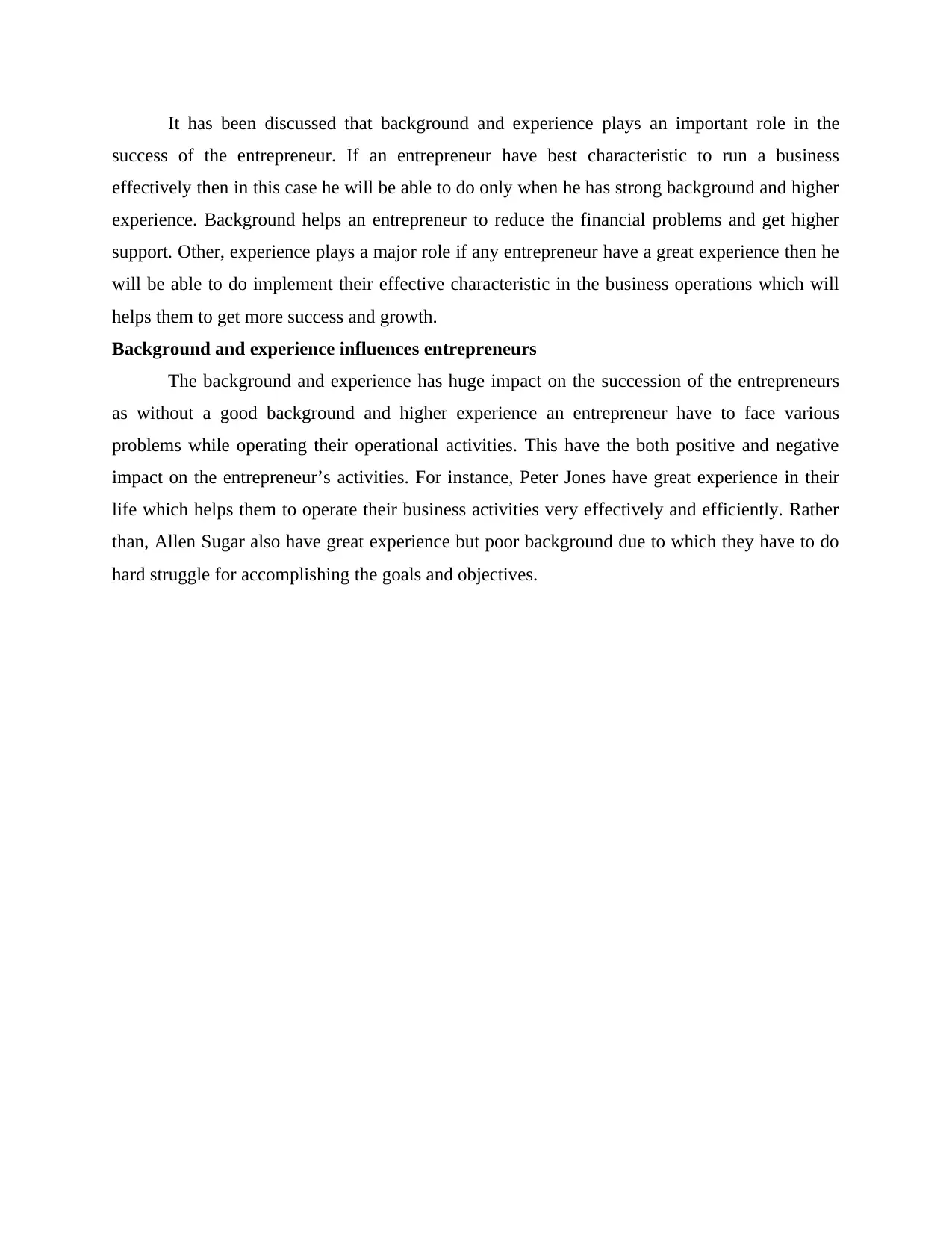
It has been discussed that background and experience plays an important role in the
success of the entrepreneur. If an entrepreneur have best characteristic to run a business
effectively then in this case he will be able to do only when he has strong background and higher
experience. Background helps an entrepreneur to reduce the financial problems and get higher
support. Other, experience plays a major role if any entrepreneur have a great experience then he
will be able to do implement their effective characteristic in the business operations which will
helps them to get more success and growth.
Background and experience influences entrepreneurs
The background and experience has huge impact on the succession of the entrepreneurs
as without a good background and higher experience an entrepreneur have to face various
problems while operating their operational activities. This have the both positive and negative
impact on the entrepreneur’s activities. For instance, Peter Jones have great experience in their
life which helps them to operate their business activities very effectively and efficiently. Rather
than, Allen Sugar also have great experience but poor background due to which they have to do
hard struggle for accomplishing the goals and objectives.
success of the entrepreneur. If an entrepreneur have best characteristic to run a business
effectively then in this case he will be able to do only when he has strong background and higher
experience. Background helps an entrepreneur to reduce the financial problems and get higher
support. Other, experience plays a major role if any entrepreneur have a great experience then he
will be able to do implement their effective characteristic in the business operations which will
helps them to get more success and growth.
Background and experience influences entrepreneurs
The background and experience has huge impact on the succession of the entrepreneurs
as without a good background and higher experience an entrepreneur have to face various
problems while operating their operational activities. This have the both positive and negative
impact on the entrepreneur’s activities. For instance, Peter Jones have great experience in their
life which helps them to operate their business activities very effectively and efficiently. Rather
than, Allen Sugar also have great experience but poor background due to which they have to do
hard struggle for accomplishing the goals and objectives.

CONCLUSION
From the above file, it can be concluded that success of the business depends on the
better entrepreneurship. The small business has a huge role in the growth of the economy by
increasing the national income and providing employment opportunities. There is different type
of entrepreneurial ventures which are different from each other in various aspects. To become a
successful entrepreneur, they must have specific traits, skills and characteristics for
accomplishing its goals and objectives effectively. For better understanding this, there are taken
two examples of two famous entrepreneurs such as Peter Jones and Allen Sugar that tells how
their background and experience influences in their success.
From the above file, it can be concluded that success of the business depends on the
better entrepreneurship. The small business has a huge role in the growth of the economy by
increasing the national income and providing employment opportunities. There is different type
of entrepreneurial ventures which are different from each other in various aspects. To become a
successful entrepreneur, they must have specific traits, skills and characteristics for
accomplishing its goals and objectives effectively. For better understanding this, there are taken
two examples of two famous entrepreneurs such as Peter Jones and Allen Sugar that tells how
their background and experience influences in their success.
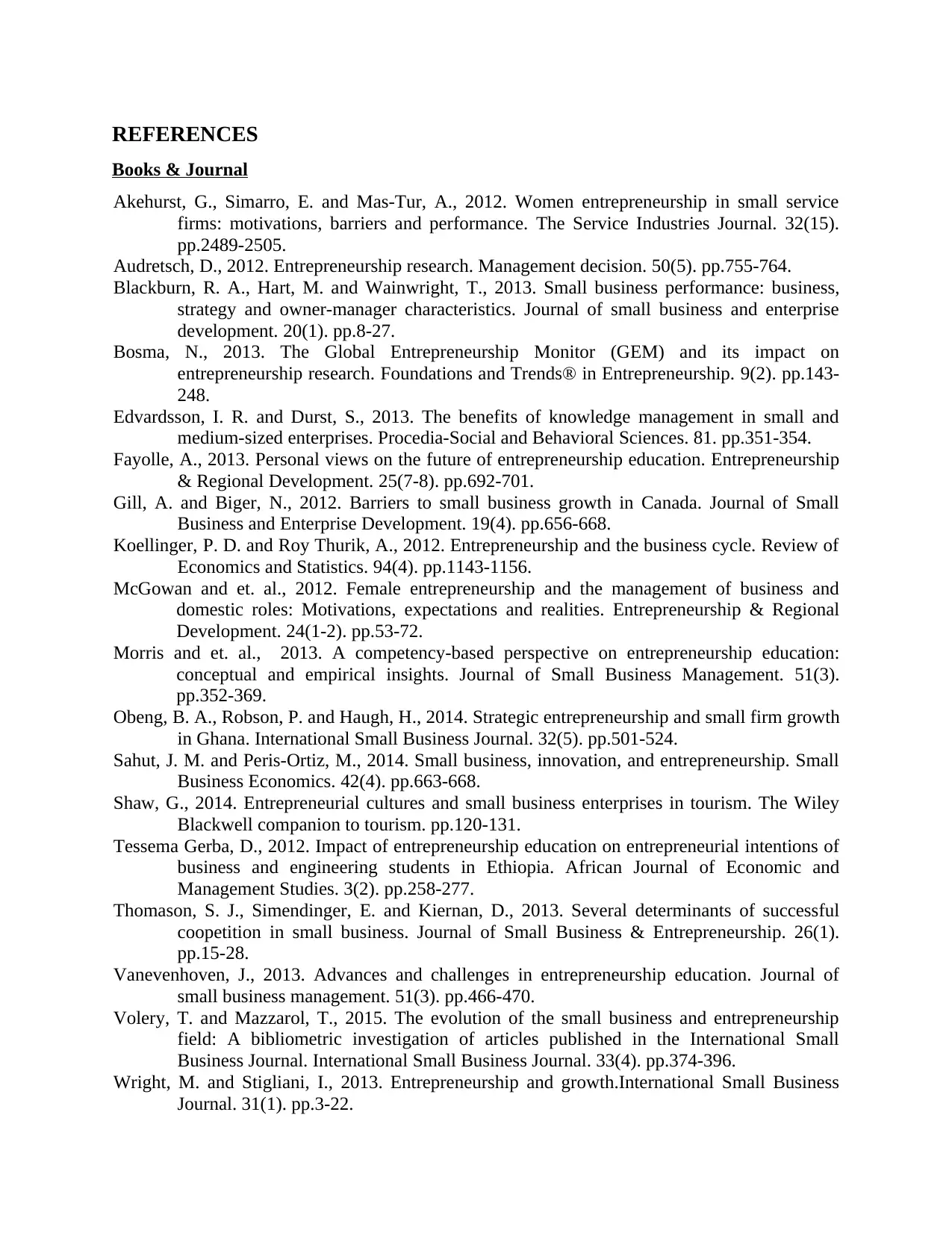
REFERENCES
Books & Journal
Akehurst, G., Simarro, E. and Mas‐Tur, A., 2012. Women entrepreneurship in small service
firms: motivations, barriers and performance. The Service Industries Journal. 32(15).
pp.2489-2505.
Audretsch, D., 2012. Entrepreneurship research. Management decision. 50(5). pp.755-764.
Blackburn, R. A., Hart, M. and Wainwright, T., 2013. Small business performance: business,
strategy and owner-manager characteristics. Journal of small business and enterprise
development. 20(1). pp.8-27.
Bosma, N., 2013. The Global Entrepreneurship Monitor (GEM) and its impact on
entrepreneurship research. Foundations and Trends® in Entrepreneurship. 9(2). pp.143-
248.
Edvardsson, I. R. and Durst, S., 2013. The benefits of knowledge management in small and
medium-sized enterprises. Procedia-Social and Behavioral Sciences. 81. pp.351-354.
Fayolle, A., 2013. Personal views on the future of entrepreneurship education. Entrepreneurship
& Regional Development. 25(7-8). pp.692-701.
Gill, A. and Biger, N., 2012. Barriers to small business growth in Canada. Journal of Small
Business and Enterprise Development. 19(4). pp.656-668.
Koellinger, P. D. and Roy Thurik, A., 2012. Entrepreneurship and the business cycle. Review of
Economics and Statistics. 94(4). pp.1143-1156.
McGowan and et. al., 2012. Female entrepreneurship and the management of business and
domestic roles: Motivations, expectations and realities. Entrepreneurship & Regional
Development. 24(1-2). pp.53-72.
Morris and et. al., 2013. A competency‐based perspective on entrepreneurship education:
conceptual and empirical insights. Journal of Small Business Management. 51(3).
pp.352-369.
Obeng, B. A., Robson, P. and Haugh, H., 2014. Strategic entrepreneurship and small firm growth
in Ghana. International Small Business Journal. 32(5). pp.501-524.
Sahut, J. M. and Peris-Ortiz, M., 2014. Small business, innovation, and entrepreneurship. Small
Business Economics. 42(4). pp.663-668.
Shaw, G., 2014. Entrepreneurial cultures and small business enterprises in tourism. The Wiley
Blackwell companion to tourism. pp.120-131.
Tessema Gerba, D., 2012. Impact of entrepreneurship education on entrepreneurial intentions of
business and engineering students in Ethiopia. African Journal of Economic and
Management Studies. 3(2). pp.258-277.
Thomason, S. J., Simendinger, E. and Kiernan, D., 2013. Several determinants of successful
coopetition in small business. Journal of Small Business & Entrepreneurship. 26(1).
pp.15-28.
Vanevenhoven, J., 2013. Advances and challenges in entrepreneurship education. Journal of
small business management. 51(3). pp.466-470.
Volery, T. and Mazzarol, T., 2015. The evolution of the small business and entrepreneurship
field: A bibliometric investigation of articles published in the International Small
Business Journal. International Small Business Journal. 33(4). pp.374-396.
Wright, M. and Stigliani, I., 2013. Entrepreneurship and growth.International Small Business
Journal. 31(1). pp.3-22.
Books & Journal
Akehurst, G., Simarro, E. and Mas‐Tur, A., 2012. Women entrepreneurship in small service
firms: motivations, barriers and performance. The Service Industries Journal. 32(15).
pp.2489-2505.
Audretsch, D., 2012. Entrepreneurship research. Management decision. 50(5). pp.755-764.
Blackburn, R. A., Hart, M. and Wainwright, T., 2013. Small business performance: business,
strategy and owner-manager characteristics. Journal of small business and enterprise
development. 20(1). pp.8-27.
Bosma, N., 2013. The Global Entrepreneurship Monitor (GEM) and its impact on
entrepreneurship research. Foundations and Trends® in Entrepreneurship. 9(2). pp.143-
248.
Edvardsson, I. R. and Durst, S., 2013. The benefits of knowledge management in small and
medium-sized enterprises. Procedia-Social and Behavioral Sciences. 81. pp.351-354.
Fayolle, A., 2013. Personal views on the future of entrepreneurship education. Entrepreneurship
& Regional Development. 25(7-8). pp.692-701.
Gill, A. and Biger, N., 2012. Barriers to small business growth in Canada. Journal of Small
Business and Enterprise Development. 19(4). pp.656-668.
Koellinger, P. D. and Roy Thurik, A., 2012. Entrepreneurship and the business cycle. Review of
Economics and Statistics. 94(4). pp.1143-1156.
McGowan and et. al., 2012. Female entrepreneurship and the management of business and
domestic roles: Motivations, expectations and realities. Entrepreneurship & Regional
Development. 24(1-2). pp.53-72.
Morris and et. al., 2013. A competency‐based perspective on entrepreneurship education:
conceptual and empirical insights. Journal of Small Business Management. 51(3).
pp.352-369.
Obeng, B. A., Robson, P. and Haugh, H., 2014. Strategic entrepreneurship and small firm growth
in Ghana. International Small Business Journal. 32(5). pp.501-524.
Sahut, J. M. and Peris-Ortiz, M., 2014. Small business, innovation, and entrepreneurship. Small
Business Economics. 42(4). pp.663-668.
Shaw, G., 2014. Entrepreneurial cultures and small business enterprises in tourism. The Wiley
Blackwell companion to tourism. pp.120-131.
Tessema Gerba, D., 2012. Impact of entrepreneurship education on entrepreneurial intentions of
business and engineering students in Ethiopia. African Journal of Economic and
Management Studies. 3(2). pp.258-277.
Thomason, S. J., Simendinger, E. and Kiernan, D., 2013. Several determinants of successful
coopetition in small business. Journal of Small Business & Entrepreneurship. 26(1).
pp.15-28.
Vanevenhoven, J., 2013. Advances and challenges in entrepreneurship education. Journal of
small business management. 51(3). pp.466-470.
Volery, T. and Mazzarol, T., 2015. The evolution of the small business and entrepreneurship
field: A bibliometric investigation of articles published in the International Small
Business Journal. International Small Business Journal. 33(4). pp.374-396.
Wright, M. and Stigliani, I., 2013. Entrepreneurship and growth.International Small Business
Journal. 31(1). pp.3-22.
Secure Best Marks with AI Grader
Need help grading? Try our AI Grader for instant feedback on your assignments.

Zaridis, A. D. and Mousiolis, D. T., 2014. Entrepreneurship and SME's organizational structure.
Elements of a successful business. Procedia-Social and Behavioral Sciences. 148.
pp.463-467.
Online
Essential Facts You Should Know about SMEs in the UK. 2019. [Online]. Available
through:<https://www.market-inspector.co.uk/blog/2017/05/facts-about-small-
medium-businesses-in-the-uk>.
Elements of a successful business. Procedia-Social and Behavioral Sciences. 148.
pp.463-467.
Online
Essential Facts You Should Know about SMEs in the UK. 2019. [Online]. Available
through:<https://www.market-inspector.co.uk/blog/2017/05/facts-about-small-
medium-businesses-in-the-uk>.
1 out of 17
Related Documents
Your All-in-One AI-Powered Toolkit for Academic Success.
+13062052269
info@desklib.com
Available 24*7 on WhatsApp / Email
![[object Object]](/_next/static/media/star-bottom.7253800d.svg)
Unlock your academic potential
© 2024 | Zucol Services PVT LTD | All rights reserved.



